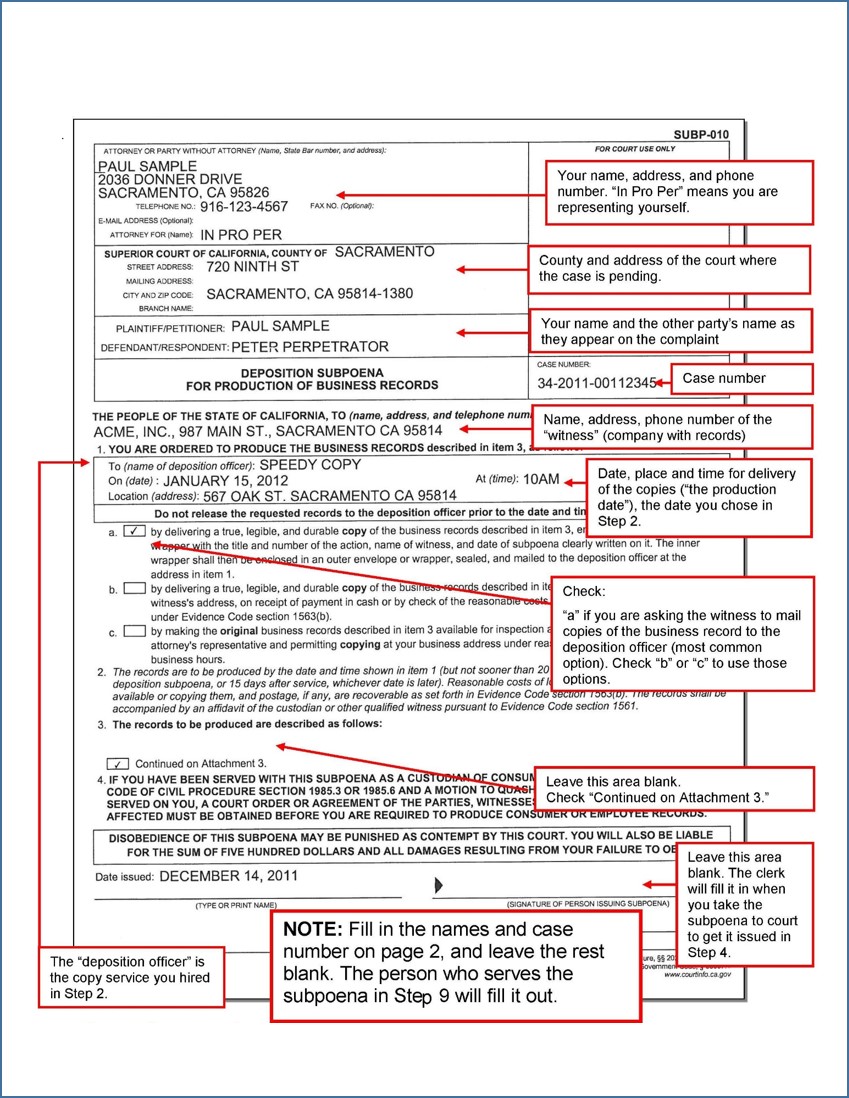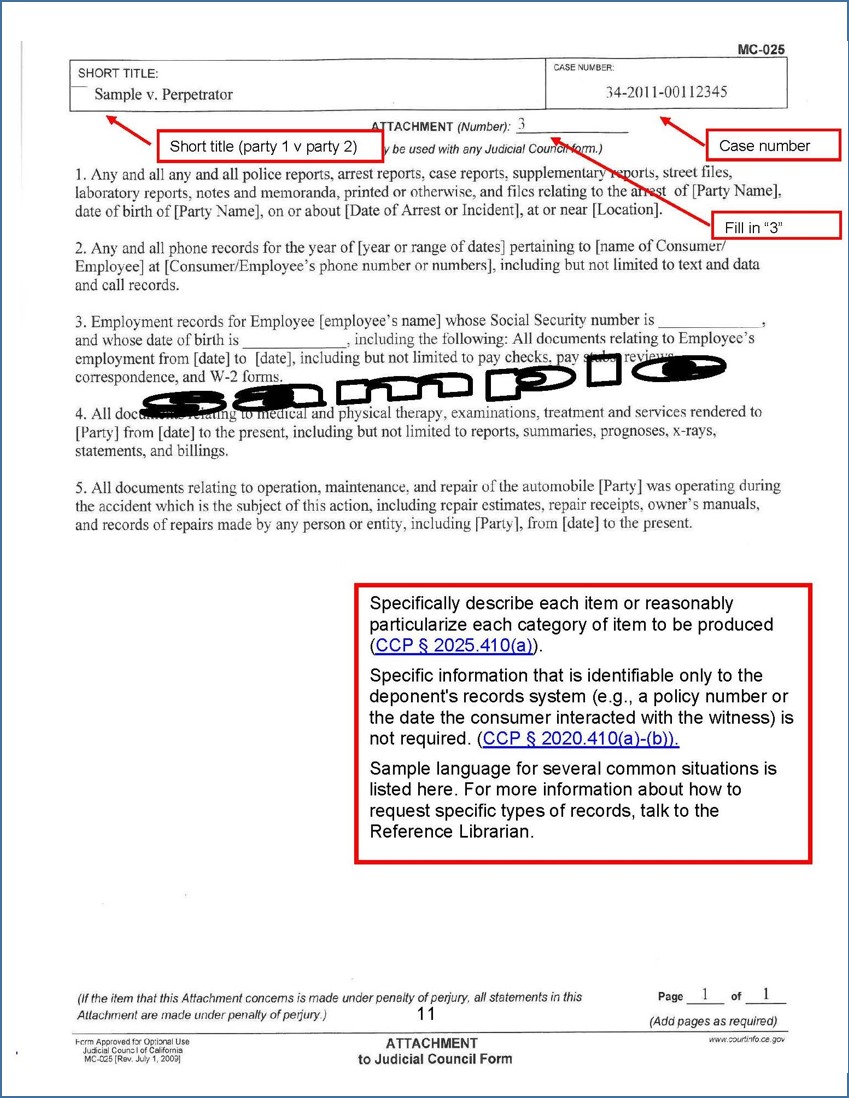Discovery: Business Records Subpoena (except consumer or employment records)
Parties in a lawsuit can use a “business records subpoena” to obtain records and information from non-party witnesses such as banks, employers, or police departments. (Cal. Code of Civil Procedure (CCP) § 2020.410.) The procedure requires several steps and takes several weeks, so start early.
Templates and Forms
- Deposition Subpoena for Production of Business Records (SUBP-010)
- Attachment (MC-025)
- Proof of Service by Mail (POS-030)
Outline of Procedure
- Decide if this is a consumer or employee record and select the correct guide.
- Choose production date and “Deposition Officer.” Fill out forms.
- Have the witness (the company or agency with records) personally served and have the parties served by mail.
Deposition Officers
What is a Deposition Officer?
Deposition Officers are professional photocopiers registered with the County Clerk. Cal. Code of Civil Procedures (CCP) 2020.420. They may be a photocopy shop or a company that specializes in assisting lawyers in litigation. Parties must use a Deposition Officer when subpoening business records.
How do I find a Deposition Officer?
Ask an attorney or paralegal if they can recommend a service, or look under “Litigation Services” or “Attorney Support Services” online or in the Yellow Pages. An online search for “deposition officer for business records subpoena in sacramento” (or whatever region you are in) will give you a list as well.
Fee Waiver does not cover your costs
Note that there will be a fee for the Deposition Officer’s service and that the third party is entitled to witness fees and copying costs. These costs are not covered by a fee waiver. You can add the cost to your judgment if you win the case.
Step-by-Step Instructions
1
Determine Whether the Documents Are “Consumer or Employee” Records
If they are, use our Consumer/Employee Record guide instead of this guide.
2
Set a Date and Location for Production, and Hire Your Deposition Officer
Select your date at least 15 days away.
Use the information in the Outline of Procedure to find a Deposition Officer.
3
Have the Court Clerk “Issue” Subpoena (Self-Represented Parties Only)
Take the Deposition Subpoena for Production of Business Records (SUBP-010) to the court where your case is pending to be “issued” (stamped with the court seal). In Sacramento, visit the main courthouse at 720 9th St., Room 102 (filing room).
Ask the clerk to issue them for you. When the clerk stamps it with the court’s seal, it becomes an official court order. The clerk will probably do it right then. You can ask them to issue several blank subpoena forms if you think you will need them later. There is no fee for this.
Attorneys can sign subpoenas themselves as “officers of the court” and do not need to take this step.
When you receive the issued subpoena, make enough copies of the stamped subpoena for yourself, the witness, and all parties. You will serve these copies in later steps.
4
Complete the Required Forms
You will need two forms to subpoena business records:
- Deposition Subpoena for Production of Business Records (SUBP-010)
- Attachment (MC-025), describing the records you need (you will number this “Attachment 3”)
Completed samples are at the end of this Guide.
NOTE: When you fill out the Deposition Subpoena for Production of Business Records (SUBP-010), there are three options for production in the first paragraph of the first page. Option “a” is having the records delivered to the Deposition Officer. It will be the easiest in most situations. Note that you must arrange to pay the witness their costs before taking delivery of the copies. Talk to your Deposition Officer about how to accomplish this. One option is to ask the Deposition Officer to pay the witness and then bill you.
Under option (b), a Deposition Officer goes to witness’s place of business to pick up the copies. Under (c), the subpoenaing party [you] goes to the witness’s place of business and copies the records. (CCP §2020.430).
Most self-represented litigants should choose option (a).
5
Serve the Witness (the Company or Agency with the Records) by Personal Service at Least 15 Days before Production Date
a. Serve the Witness
Serve these documents at least 15 days before the production date. (CCP § 2020.410(c)):
- Deposition Subpoena for Production of Business Records (SUBP-010)
- Attachment (MC-025)
- Proof of Service by Mail (POS-030) on all parties (unsigned but otherwise complete).
The server (a person over the age of 18 who is not a party to the case) must personally deliver the required documents on the witness or its representative, along with a check for fees. If the witness is an organization, any officer, director, custodian of records, or any agent or employee authorized by the organization to accept service of a subpoena can be served on behalf of the organization. (CCP § 2020.220.)
The server then signs the proof of service form on the back of the Deposition Subpoena for Production of Business Records (SUBP-010) and returns it to you. Keep this in case you need it for a motion later.
b. Serve the Other Party or Parties
Serve by mail all parties (or their attorneys) with copies of
- Stamped Deposition Subpoena for Production of Business Records (SUBP-010) and Attachment (MC-025).
6
Wait for the Documents
You’re done for now. The Deposition Officer should receive the documents by your chosen production date.
If your Deposition Subpoena is ignored, or you get nothing but a written objection, you may need to file a motion in court to compel the witness to produce the documents. For more information, see our guide Motion to Compel Discovery Responses.
For Help
For assistance with a business records subpoena, your Deposition Officer may do the entire process (forms, service, and copying) for you for a fee. Ask an attorney or paralegal if they can recommend a service, or look under “Litigation Services” or “Attorney Support Services” online or in the Yellow Pages. An online search for “deposition officer for business records subpoena in sacramento” (or whatever region you are in) will give you a list as well.
For More Information
On the Web:
NOLO Law for All: “Formal Discovery: Gathering Evidence for Your Lawsuit”
This respected self-help site offers excellent information on discovery in general.
California Courts: “Getting Information to Help Your Case”
Information from the Judicial Council’s self-help website. Contains information about subpoenas for admission in a court trial or hearing.
At the Law Library:
The following books have information about preparing business records subpoenas:
- California Forms of Pleading and Practice KFC 1010 .A65 C3
- California Practice Guide: Civil Procedure before Trial KFC 995 .W45 Chap. 8, Discovery, Sec. 540-555.
- Litigation by the Numbers KFC 995 .G67 Chap.5, Discovery, Sec. 5.3.5.
These books give detailed discussion of the steps needed to use a business records subpoena. Civil Procedure before Trial in particular contains discussion of the applicable statutes and cases.
For examples of the types of documents you may want to request in different types of civil cases, see:
- Deposition Checklists and Strategies KF 8900 .S33
This book is divided into chapters by type of case (vehicular liability, premises liability, medical malpractice, etc.). Each chapter has a section on “Documents and Exhibits” which lists the types of documents that may be useful in that type of case. - California Points and Authorities KFC 1010. B4 (Ready Reference) Vol. 8, Chap. 81, Sec. 240-254
Contains information and forms for consumer/employee objections.
Samples
Deposition Subpoena for Production of Business Records


This material is intended as general information only. Your case may have factors requiring different procedures or forms. The information and instructions are provided for use in the Sacramento County Superior Court. Please keep in mind that each court may have different requirements. If you need further assistance consult a lawyer.




